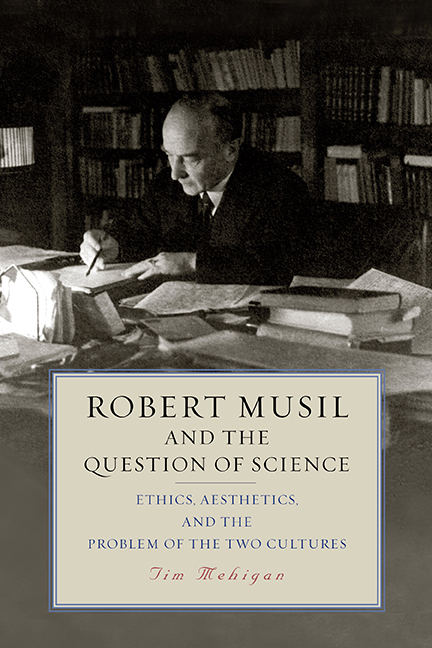Book contents
- Frontmatter
- Contents
- Preface
- Introduction: Musil’s Intellectual Position
- Part I Musil and the Two Cultures
- Part II Aesthetics and Ethics in the Context of the Two Cultures
- Conclusion: “A General Secretariat of Precision and Soul”: Ethics, Knowledge, and Literature after the Fourth Revolution 149
- References
- Index
6 - Musil’s Concept of Value
Published online by Cambridge University Press: 26 April 2020
- Frontmatter
- Contents
- Preface
- Introduction: Musil’s Intellectual Position
- Part I Musil and the Two Cultures
- Part II Aesthetics and Ethics in the Context of the Two Cultures
- Conclusion: “A General Secretariat of Precision and Soul”: Ethics, Knowledge, and Literature after the Fourth Revolution 149
- References
- Index
Summary
CRITICAL OPINION ABOUT The Man Without Qualities—and by implication, the works leading up to the novel seen to represent earlier stages of a consistent intellectual project—has not reached unanimity in regard to Musil's intentions. Disagreement is concentrated in particular on the meaning of the sibling idyll in book 2 of the novel. Part of the disagreement among critics has come from the fact that the novel was not completed during the author's lifetime. In this respect the reader of Musil's novel faces a situation of uniquely challenging proportions, where questions of this type must be raised: did the novel remain incomplete simply because Musil ran out of time at the end of his life, or was he unable to complete it because of his own uncertainty about its themes and direction, thus suggesting that Musil would never have finished the novel even if he had lived longer?
Since these questions have never been properly answered in Musil scholarship, some critics have preferred to focus attention on those parts of the novel that were published during the author's lifetime, in particular, Musil's satirical portrait of Viennese society that forms the focus of book 1 of the novel. The highwater mark of such attention is certainly Norbert Wolf's monumental Kakanien als Gesellschaftskonstruktion (2011), a study that values the novel for the comprehensive sociocritical portrait of modern life that it draws. David Luft's Robert Musil and the Crisis of European Culture 1880–1942 (1980) had already assayed similar territory in an early study written in English. Another English-language critical work of note is Mark Freed's Robert Musil and the NonModern (2011), which arises from the interest in the sociological, but connects this interest to a critique of modernity (see chapter 5 for an extended discussion of Musil in relation to the crisis of modernity). Freed's study is valuable for several reasons, including for the attention it gives to the idyll of the sibling lovers. Freed reads this idyll, and the ground of the “Other Condition” in which it is rooted, in positive terms as “a strategy of autonomy” directed against those who would seek “to realize their wills through the instrumental use of others” (Freed 130).
- Type
- Chapter
- Information
- Robert Musil and the Question of ScienceEthics, Aesthetics, and the Problem of the Two Cultures, pp. 92 - 109Publisher: Boydell & BrewerPrint publication year: 2020



